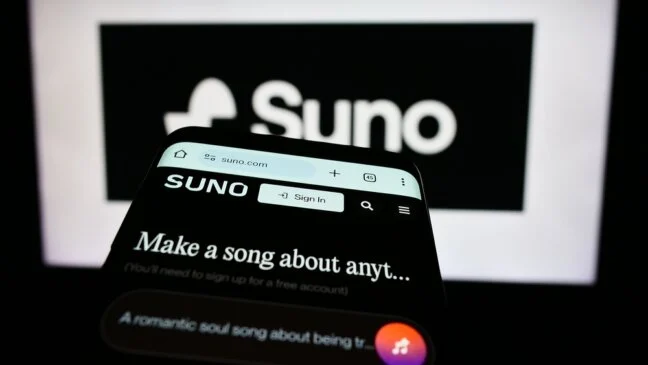Major record labels have fired back at Suno’s attempt to dismiss allegations that the AI music startup illegally downloaded copyrighted songs from YouTube.
They argued that Suno violated federal anti-circumvention laws regardless of any fair use defense.
In a reply brief filed on Monday (October 20) in Massachusetts federal court, and obtained by MBW, lawyers for labels owned by Sony Music, Universal Music Group and Warner Music Group defended their expanded lawsuit against Suno.
The music companies are suing Suno for mass infringement of copyright, alleging the AI startup used copyrighted recordings without permission to train its AI.
You can read the latest filing in full here.
In September, they filed a proposed amended complaint expanding the claims against Suno. They alleged that the AI company got its hands on the recordings by “stream-ripping” them from YouTube, i.e., by circumventing YouTube’s player window and downloading the files directly.
In response, Suno on October 3 asked the court to throw out the latest stream-ripping allegations. While Suno didn’t deny “stream-ripping” music from YouTube, the company’s lawyers argued that the practice is not illegal under the Digital Millennium Copyright Act (DMCA).
“The violation lies in the circumvention, not the reason for it.”
Lawyers for UMG, Sony Music and Warner Music subsidiaries
“The Court should deny leave to amend to add this new claim because it is futile,” stated Suno’s response, which can be read in full here.
Lawyers for the music companies have argued that Suno bypassed YouTube’s “rolling cipher” encryption system, which regularly changes access codes to prevent external downloading of videos and audio files.
They are now arguing: “The violation lies in the circumvention, not the reason for it.”
They noted that Section 1201 of the DMCA prohibits the act of bypassing technological measures that control access to copyrighted works, separate from any copyright infringement claims.
They wrote: “If Suno wanted fair use to shield it from liability entirely, it could have acquired its training data lawfully. Instead, it chose a cheaper and faster route: stream-ripping from YouTube.”
“If Suno wanted fair use to shield it from liability entirely, it could have acquired its training data lawfully. Instead, it chose a cheaper and faster route: stream-ripping from YouTube.”
Lawyers for UMG, Sony Music and Warner Music subsidiaries
“Suno has asserted fair use with respect to its subsequent copying… but fair use cannot excuse its unlawful access to Plaintiffs’ works in the first place.”
Suno had argued on October 3 that the amended lawsuit represents “a gambit to try to evade application of the fair use doctrine to Suno’s technology development process.”
Suno’s lawyers argued that the relevant part of the DMCA bans circumventing access controls on copyrighted media, meaning technology designed to limit access only to certain people (for instance, paying subscribers), and not copy controls, meaning tech that prevents people from copying copyrighted material.
In response, the music companies’ lawyers said Suno “wrongly treats” controlling access under Section 1201 “as an all-or-nothing proposition, arguing that once a copyright owner makes a work accessible to the public to any degree, no ‘access control can exist”
Citing a court’s 2001 decision in Universal City Studios v. Corley, the labels’ lawyers wrote: “Fair use has never been held to be a guarantee of access to copyrighted material in order to copy it by the fair user’s preferred technique or in the format of the original.”
The labels asked the court to grant their motion for leave to amend, arguing that their proposed amended complaint “easily meets” the standard for stating a claim.
On Friday (October 17), Bloomberg reported, citing people familiar with the matter, that Suno is in negotiations to raise over $100 million in a funding round that would value the company at more than $2 billion, a fourfold increase from the previous valuation.
Music Business Worldwide


